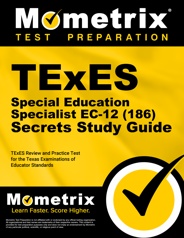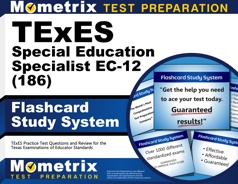The TExES Special Education Specialist EC-12 (186) exam is administered for those interested in becoming an educator within the Texas public school system, specifically for teaching special education to children from early childhood through the 12th grade.
Click “Start Test” above to take a free TExES Special Education Specialist EC-12 practice test!
TExES Special Education Specialist Exam Outline
The TExES Special Education Specialist EC-12 exam contains 90 multiple-choice questions and one constructed-response question, and you will have a time limit of 4 hours and 45 minutes.
The questions are split into five domains:
I. Legal and Ethical Guidelines and Knowledge of Learners (18%)
The questions in this domain assess your knowledge of the following topics:
- Major state guidelines and key court cases that have affected teaching special education students
- IDEA eligibility categories for special education
- The roles and responsibilities of the special education teacher regarding Child Find
- Similarities and differences between Section 504 plans and IEPs
- Confidentiality, components, and maintenance of eligibility folders
- Components of IEPs and IFSPs
- Auditing student class schedules to ensure LRE and IEP compliance
- Legal responsibilities of all school staff regarding IEP implementation
- Roles and responsibilities of the ARD committee
- State and federal requirements for transition planning from age 14
- Graduation options and requirements for students
- The impact of disabilities on developmental milestones, learning, and social skills
- Multiple influences that may impact individual strengths and needs of students
- Factors that contribute to stress and trauma
- Addressing stress, trauma, protective factors, resilience, and supportive relationships
- The impact of brain development on learning
II. Assessment and Program Planning (18%)
The questions in this domain assess your knowledge of the following topics:
- Various forms of assessments
- Strategies for assessing student learning and behavior
- Administering, interpreting, and gathering baseline data from screening instruments and diagnostic assessments
- Formative and summative assessments
- Obtaining additional expert guidance and collaboration
- Interpreting results of multiple assessments and evaluation data
- Identifying and implementing appropriate accommodations and modifications during assessments
- Interpreting results of a variety of assessment data for various purposes
- Identifying learning goals and adjusting instruction
- The impact of academic, social, and functional development on levels of support needs in IEP development
- Coordinating effectively with staff and service providers
- Informing the drafting of students’ IEPs
- Creating, scheduling, and facilitating ongoing IEP transition activities
- Preparing for ARD committee meetings
- Preparing and supporting students in ARD committee meeting discussions
III. Curricular Knowledge and Instructional Practices (27%)
The questions in this domain assess your knowledge of the following topics:
- Developing specially designed and individualized instruction, goals and objectives
- Using TEKS subject matter to inform programmatic and instructional decisions
- Modifying and differentiating instruction for a wide range of student performance levels
- Integrating TEKS subject matter to inform individual student’s needs in different contexts
- Key components of various postsecondary employment models and pathways
- Barriers to accessibility for students receiving special education services
- Key differences between IEP accommodations and modifications
- Designing explicit, scaffolded, systematic, and individualized instruction
- Selecting and using a variety of grouping strategies
- Types of assistive technology
- Planning and delivering high-quality, meaningful, and age-appropriate learning experiences for students
- Effective procedures and routines to create safe and organized learning environments
- Research-based de-escalation strategies
- How various factors may impact student behavior in the learning environment
- Interpreting FBAs to collect and analyze data to design behavioral interventions
- Monitoring effectiveness of behavioral interventions
- Preventative practices to address possible traumas
IV. Professional Collaboration, Learning, and Responsibilities (18%)
The questions in this domain assess your knowledge of the following topics:
- Collaborating in a differentiated manner with parents/guardians, school personnel, and specialists
- Supervising and mentoring paraprofessionals to identify responsibilities and skills needed for their roles
- Best practices in consulting, co-planning, and co-teaching with campus staff and/or colleagues
- Implementing transition activities in students’ IEPs that include community resources
- Effective collaboration with general education teachers
- Collaborating and consulting with multidisciplinary teams to plan and implement instruction
- Selecting and utilizing resources to improve communication and collaboration with families and the community
- Coordinating with related service providers and community agencies
- The roles and responsibilities of the EC-12 special education teacher
- Effective strategies to advocate for the improved outcomes for students who receive special education services
- The importance of setting short-term and long-term professional goals based on ongoing analysis of student learning
- Advocacy for social, legal, and environmental changes and/or priorities for students
- Advocating for family and student participation in the IEP process
V. Professional Collaboration, Learning, and Responsibilities (20%)
The question in this domain is the constructed-response question.
You will be asked to write a response analyzing and interpreting various types of data to identify a given student’s strengths and needs. You will also be asked to include a design for appropriate instruction within your writing.
Check Out Mometrix's TExES Study Guide
Get practice questions, video tutorials, and detailed study lessons
Get Your Study Guide
Registration
To register for the exam, you must create an online NES account via their website. Once your account has been created, you can use it to register for the exam and schedule an exam date. When you register, you will need to pay the $136 examination fee.
Test Day
You should arrive at the testing center 15-30 minutes prior to your scheduled exam time. This will leave you enough time to go through the check-in process. After you arrive, you will be asked to present one form of valid, government-issued photo ID.
After the check-in process, you will be asked to leave all personal items (cell phone, bags, notes, wallet, coat, etc.) in a secure locker outside the testing area.
Once you enter the testing room, you will be asked to sign an NDA, and you will be given a brief tutorial on the testing system. Once the tutorial is complete, the exam will begin.
You are allowed to take a restroom break during the exam, but the timer will not be paused while you are away.
How the Test is Scored
The questions on this exam are scored on a scale of 100-300.
To pass the exam, your final scaled score must be 240 or higher.
Check Out Mometrix's TExES Flashcards
Get complex subjects broken down into easily understandable concepts
Get Your Flashcards
FAQs
Q
How many questions are on the TExES Special Education Specialist EC-12 exam?
A
There are 90 multiple-choice questions and one constructed-response question on the exam.
Q
How long is the TExES Special Education Specialist EC-12 exam?
A
The time limit for this exam is 4 hours and 45 minutes.
Q
What is the passing score for the TExES Special Education Specialist EC-12 exam?
A
To pass the exam, you must achieve a scaled score of at least 240.
Q
How much does the TExES Special Education Specialist EC-12 exam cost?
A
The examination fee for this exam is $136.
Mometrix Test Preparation is not affiliated with or endorsed by any official testing organization. All organizational and test names are trademarks of their respective owners.

